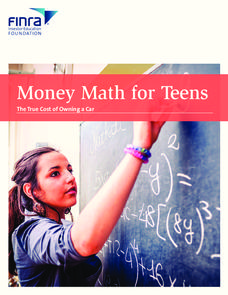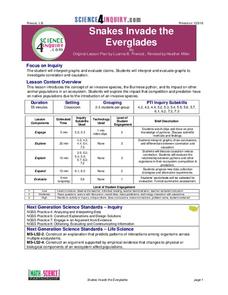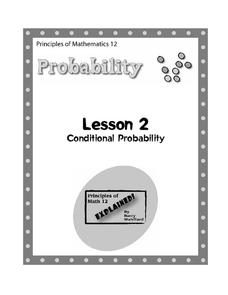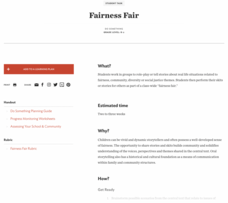Institute for Teaching through Technology and Innovative Practices
The Right Number of Elephants
How can you tell if a number of items is reasonable? Combine math and language arts with a fun lesson based on Jeff Shepard's The Right Number of Elephants. After reading the book, kids discuss amounts of other items and create minibooks...
Charleston School District
Sketching a Piecewise Function
How do you combine linear and nonlinear functions? You piece them together! The lesson begins by analyzing given linear piecewise functions and then introduces nonlinear parts. Then the process is reversed to create graphs from given...
Allegany-Limestone Central School
Plantae WebQuest
Send your young life scientists on a plant webquest that has them reading case studies to decide if seeds are seeds and plants are plants.
PBS
Stories of Painkiller Addiction: Prescription Drug Abuse Awareness Campaign
The I-STOP law was designed to regulate the distribution and tracking of prescription drugs. After reading an article about its signing and implementation, middle and high schoolers work together to come up with their own ideas for an...
Skyscraper Museum
Building a Skyscraper
The construction of skyscrapers is no simple undertaking, involving the careful coordination and planning of many different people. The third lesson in this series explores this detailed process by first teaching children about the main...
Constitutional Rights Foundation
Ellis Island—The “Golden Door” to America
Are you one of the 100 million Americans whose ancestors passed through the doors of Ellis Island? Learn about the historic entry point for immigrants in the late 19th and early 20th centuries with an informative reading passage. After...
Scholastic
Adding and Subtracting Ten
Developing fluency with basic addition and subtraction is fundamental to the success of all young mathematicians. This four-day lesson series begins with learners using ten-frames and hundreds charts to recognize patterns when adding and...
Curated OER
Our Classroom Constitution
Develop a system of classroom rules created by the kids, for the kids with this three-part lesson series on the US Constitution. After learning about the structure of the Constitution and the government it established, young scholars...
Texas Commission on Environmental Quality
Environmental Sciences
Whether you are teaching environmental science in junior high or studying recycling in kindergarten, there is something for all in this set of lessons designed for environmental education. The 110-page packet comes with tips for teaching...
SaveandInvest.org
The True Cost of Owning a Car
Almost every teen wants a car, but can they really afford one? The lesson walks pupils through how to identify a budget, find all of the costs associated with car ownership, and determine if they should buy the car or keep looking.
Science 4 Inquiry
Snakes in the Everglades
The Burmese python is on the loose ... and he's hungry! Illustrate the differences between causative and correlative relationships through an inquiry lesson. Pupils examine several sources of information to determine if there is a...
Serendip
Using Molecular and Evolutionary Biology to Understand HIV/AIDS and Treatment
HIV mutates rapidly, making treatments challenging to find. Scholars learn about why it mutates so quickly and how scientists race to find treatments. The resource approaches the issue from both a molecular and evolutionary perspective...
Math12
Conditional Probability
Conditional probability can be a confusing concept. A straightforward lesson provides reasonable examples of conditional probability, and models the most effective ways to reinforce the more complex parts of the lesson.
Outdoor Learning Center
Outdoor Survival
Which of the following can you survive without for the longest time: water, food, or a positive mental attitude? The answer may surprise you. Guide learners of all ages through games, activities, and discussions about surviving in the...
Institute of Electrical and Electronics Engineers
Adaptive Device Design
After reading about how engineering has made adaptive devices possible for people with disabilities, pupils work in groups to discuss different devices to determine whether or not they are adaptive. They also disassemble a pair of...
Association of American Geographers
Project GeoSTART
Investigate the fascinating, yet terrifying phenomenon of hurricanes from the safety of your classroom using this earth science unit. Focusing on developing young scientists' spacial thinking skills, these lessons engage learners in...
Utah Education Network (UEN)
Self-Concept: Self-Esteem
Most teenagers struggle with self-image and self-esteem. Guide them through these stormy waters with a series of activities focused on positive messages, true friendship and support, and self-concept.
Chicago Botanic Garden
Are Global CO2 Levels Changing?
According to the Mauna Loa observatory, carbon dioxide levels increased by 3 ppm in our atmosphere between 2015–2016. Individuals analyze carbon dioxide data from around the world and then share this with a home group in instructional...
National Institute on Drug Abuse
The Brain's Response to Drugs
Marijuana affects the brain differently than inhalants, which have a different effect than opioids. Elementary and middle school classes read about these drugs as well as nicotine, methamphetamine, hallucinogens, and steroids before...
Learning Games Lab
Nitrogen in Fertilizer
Nitrogen is an essential element for productive farming. An interactive lesson explores the chemical makeup of different fertilizers and their corresponding nitrogen content. The interactive challenges individuals to complete molecular...
Curated OER
Acid Rain
Create a simulation of acid rain in your classroom with lemon juice and bean plants to help kids study the effects of pollution on plants. In addition, learners will listen to a story and write responses based on guiding questions.
Howard Hughes Medical Institute
Tracking Genetically Modified Mosquitoes
What's that buzzing in your ear? An insightful lesson about genetically modified mosquitoes! Partnered pupils explore the creation, release, and monitoring of mosquitoes designed to reduce the mosquito population. After watching a video,...
Teaching Tolerance
Fairness Fair
How can we create a more fair world? Chances are, class members have some ideas! After reading a text about fairness, individuals create skits around the ideas of fairness. Extend the learning and make their presentations a...
Houghton Mifflin Harcourt
Problem Solvers: Challenge Activities (Theme 4)
Creative activities help bring literature alive. The first of a set of lessons designed to accompany selections from Theme 4: Problem Solvers uses activities such as skits, responses to music, and social studies projects. These...
Other popular searches
- Guided Reading Lessons Plans
- Guided Reading Lessons 4 6
- Guided Reading Lessons K 2
- Free Guided Reading Lessons
- Guided Reading Lessons Frogs
- Guided Reading Lessons 3 6
- Ell Guided Reading Lessons

























